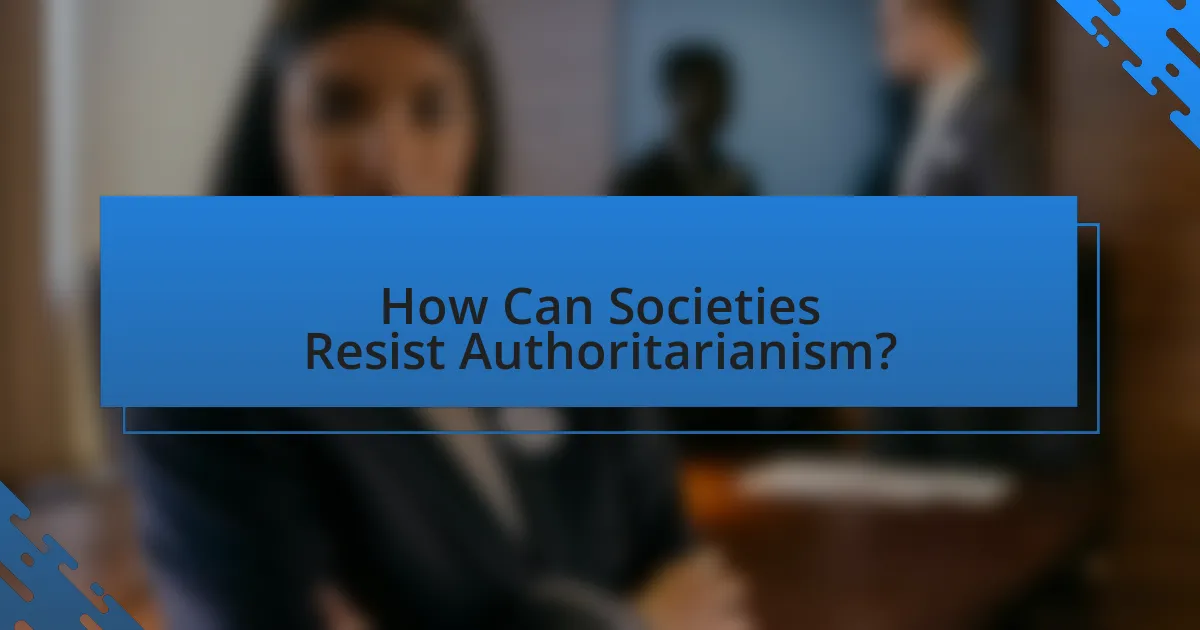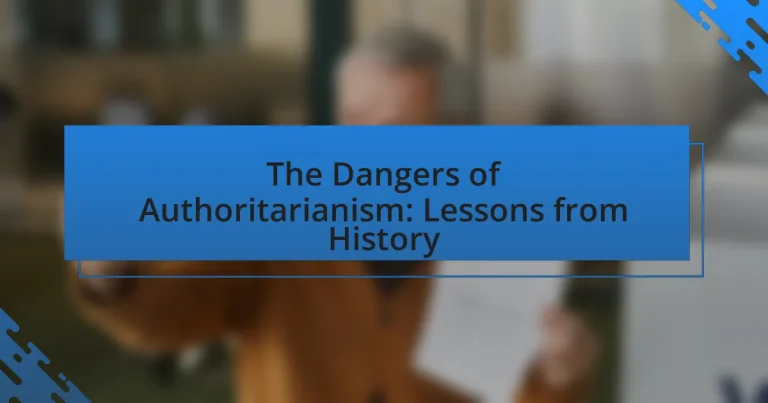Authoritarianism is a political system marked by the concentration of power in a single authority or a small group, leading to the suppression of individual freedoms and democratic processes. This article examines the dangers of authoritarianism, highlighting its historical manifestations and the common characteristics of authoritarian regimes, such as repression, propaganda, and manipulation of social institutions. It discusses the psychological and social impacts on individuals, the erosion of civil liberties, and the long-term societal consequences of living under such governance. Additionally, the article explores strategies for resisting authoritarianism, the role of civil society, and lessons learned from historical resistance movements, emphasizing the importance of civic engagement and education in promoting democratic values.

What is Authoritarianism and Why is it Dangerous?
Authoritarianism is a political system characterized by the concentration of power in a single authority or a small group, often leading to the suppression of individual freedoms and democratic processes. This system is dangerous because it undermines civil liberties, restricts political pluralism, and can lead to human rights abuses, as seen in historical examples like Nazi Germany and Stalinist Russia, where dissent was violently quashed and millions suffered under oppressive regimes. The lack of checks and balances in authoritarian systems often results in corruption, abuse of power, and the erosion of societal trust, ultimately destabilizing nations and leading to conflict.
How does authoritarianism manifest in different societies?
Authoritarianism manifests in different societies through centralized control, suppression of dissent, and limited political freedoms. In countries like North Korea, the government maintains strict control over all aspects of life, including media and personal expression, exemplified by the regime’s use of propaganda and severe penalties for opposition. In Russia, authoritarianism is evident through the manipulation of elections, suppression of independent media, and the persecution of political opponents, as seen in the cases of Alexei Navalny and other activists. In China, the Communist Party enforces authoritarian rule by restricting internet access, censoring information, and implementing social credit systems to monitor and control citizens’ behavior. These manifestations illustrate how authoritarianism adapts to cultural and historical contexts while undermining democratic principles and human rights.
What are the common characteristics of authoritarian regimes?
Authoritarian regimes commonly exhibit centralized control, limited political pluralism, and suppression of dissent. Centralized control is often maintained through a single party or leader who exerts significant influence over state institutions and society. Limited political pluralism is characterized by the absence of competitive elections and restrictions on opposition parties, which diminishes the public’s ability to participate in governance. Suppression of dissent is evident through censorship, state-controlled media, and the use of violence or intimidation against critics, as seen in historical examples like the Soviet Union under Stalin and North Korea under Kim Il-sung. These characteristics collectively create an environment where individual freedoms are curtailed, and the state’s authority is prioritized over personal liberties.
How do authoritarian governments maintain control over their populations?
Authoritarian governments maintain control over their populations through a combination of repression, propaganda, and manipulation of social institutions. Repression involves the use of state violence, censorship, and surveillance to suppress dissent and instill fear among citizens. For example, regimes like North Korea employ extensive surveillance systems and harsh penalties for opposition, effectively stifling any potential challenges to their authority.
Propaganda is utilized to shape public perception and promote the government’s narrative, often portraying the regime as a protector against external threats. Historical instances, such as the Soviet Union under Stalin, demonstrate how state-controlled media can create a distorted reality that reinforces loyalty and compliance among the populace.
Additionally, authoritarian governments manipulate social institutions, including education and religion, to promote ideologies that support their rule. For instance, in China, the Communist Party exerts control over educational content to instill party loyalty from a young age, ensuring that future generations align with the regime’s values. These strategies collectively enable authoritarian governments to maintain a firm grip on power and limit the potential for opposition.
What historical examples illustrate the dangers of authoritarianism?
Historical examples that illustrate the dangers of authoritarianism include the regimes of Adolf Hitler in Nazi Germany and Joseph Stalin in the Soviet Union. Hitler’s totalitarian rule led to the genocide of six million Jews during the Holocaust and the deaths of millions in World War II, showcasing the extreme consequences of unchecked power and state-sponsored violence. Similarly, Stalin’s regime was marked by widespread purges, forced labor camps, and famines, resulting in the deaths of an estimated 20 million people, highlighting the oppressive nature of authoritarian governance and its capacity for human rights violations. These instances serve as critical reminders of the potential for authoritarianism to lead to catastrophic outcomes for society.
What lessons can be learned from the rise of totalitarian regimes in the 20th century?
The rise of totalitarian regimes in the 20th century teaches that unchecked power leads to oppression and human rights violations. Historical examples, such as Nazi Germany and Stalinist Soviet Union, illustrate how authoritarian leaders manipulate societal fears and economic instability to consolidate control. The systematic suppression of dissent, as seen in these regimes, highlights the importance of safeguarding democratic institutions and civil liberties. Furthermore, the consequences of propaganda and state-controlled media demonstrate the need for a well-informed citizenry to resist authoritarianism. These lessons underscore the critical necessity of vigilance against the erosion of democratic norms and the importance of accountability in governance.
How did authoritarianism impact civil liberties in various countries?
Authoritarianism significantly curtailed civil liberties in various countries by suppressing freedom of speech, assembly, and the press. For instance, in countries like North Korea and China, strict government control over media and public discourse has led to the imprisonment of dissenters and the censorship of information, effectively stifling any opposition to the ruling regime. Historical evidence shows that during the military dictatorship in Argentina from 1976 to 1983, thousands of people were “disappeared,” and civil liberties were systematically violated, demonstrating the extreme consequences of authoritarian governance. Similarly, in Russia under Vladimir Putin, laws restricting protests and controlling media have severely limited citizens’ rights to express dissent, illustrating a broader trend where authoritarian regimes prioritize state control over individual freedoms.

What are the Psychological and Social Impacts of Authoritarianism?
Authoritarianism leads to significant psychological and social impacts, including increased anxiety, fear, and social isolation among individuals. Research indicates that living under authoritarian regimes can result in chronic stress due to the suppression of dissent and the constant threat of punishment, which can manifest as mental health issues such as depression and PTSD. For instance, a study published in the Journal of Political Psychology found that individuals in authoritarian societies often experience heightened levels of anxiety and a diminished sense of agency, as their freedoms are restricted and their voices silenced. Socially, authoritarianism fosters distrust among citizens, erodes community bonds, and promotes divisiveness, as people may feel compelled to conform to the regime’s ideologies to avoid repercussions. This environment can lead to a breakdown of social cohesion, as individuals prioritize self-preservation over collective well-being.
How does authoritarianism affect individual behavior and thought?
Authoritarianism significantly alters individual behavior and thought by promoting conformity and suppressing dissent. Under authoritarian regimes, individuals often experience heightened fear and anxiety, leading to self-censorship and a reluctance to express personal beliefs. Research indicates that such environments foster a culture of obedience, where people prioritize loyalty to authority over critical thinking. For instance, studies have shown that citizens in authoritarian states are less likely to engage in political discussions or challenge government narratives, as seen in historical examples like Stalin’s Soviet Union, where dissent was met with severe repercussions. This suppression of free thought not only stifles creativity and innovation but also reinforces the power of the authoritarian regime, creating a cycle of control and compliance.
What role does propaganda play in shaping public perception?
Propaganda plays a crucial role in shaping public perception by influencing beliefs, attitudes, and behaviors through biased or misleading information. Historically, authoritarian regimes have utilized propaganda to control narratives, manipulate emotions, and create a favorable image of their governance. For instance, during World War II, the Nazi regime employed propaganda extensively to dehumanize enemies and promote nationalism, which significantly affected public sentiment and mobilized support for their policies. This manipulation of information can lead to widespread acceptance of ideologies that may not align with objective reality, demonstrating the power of propaganda in altering societal views and justifying authoritarian practices.
How does fear influence compliance among citizens?
Fear significantly increases compliance among citizens by creating a psychological environment where individuals prioritize safety and security over personal freedoms. When citizens perceive threats, whether real or perceived, they are more likely to adhere to rules and regulations imposed by authorities to avoid negative consequences. Historical examples, such as the rise of totalitarian regimes, illustrate this phenomenon; during the Nazi regime in Germany, fear of persecution led many citizens to comply with oppressive laws and policies. Research indicates that fear can activate a compliance mechanism, as seen in studies showing that individuals exposed to fear-inducing messages are more likely to conform to authority directives. This dynamic underscores how fear can be exploited by authoritarian governments to maintain control and suppress dissent.
What are the long-term societal consequences of living under authoritarian rule?
Living under authoritarian rule leads to significant long-term societal consequences, including diminished civil liberties, weakened institutions, and pervasive social distrust. Authoritarian regimes often suppress free speech and political dissent, resulting in a culture of fear and compliance among citizens. This suppression can erode democratic values and civic engagement over generations, as seen in countries like North Korea and Venezuela, where citizens face severe restrictions on their rights and freedoms.
Moreover, authoritarian governance typically undermines the rule of law and judicial independence, leading to corruption and abuse of power. For instance, in Russia, the centralization of power has resulted in widespread corruption and a lack of accountability, which further entrenches authoritarian practices.
Additionally, the long-term psychological impact on society includes increased apathy and resignation among the populace, as individuals may feel powerless to effect change. Historical examples, such as the impact of the Soviet regime on Eastern Europe, illustrate how prolonged authoritarian rule can stifle innovation and economic development, ultimately hindering societal progress.
In summary, the long-term societal consequences of living under authoritarian rule manifest in the erosion of freedoms, weakened institutions, and a culture of distrust, which can persist long after the regime has ended.
How does authoritarianism affect social trust and community cohesion?
Authoritarianism significantly undermines social trust and community cohesion by fostering an environment of fear and repression. In authoritarian regimes, citizens often experience a lack of transparency and accountability from their leaders, which erodes trust in institutions and among individuals. For instance, studies have shown that in countries with authoritarian governance, such as North Korea and Venezuela, citizens report lower levels of trust in their government and fellow citizens due to pervasive surveillance and the suppression of dissent. This lack of trust can lead to social fragmentation, as individuals become wary of engaging with one another, fearing repercussions for expressing their opinions or forming associations. Consequently, community cohesion deteriorates, as people are less likely to collaborate or support one another in a climate of suspicion and fear.
What impact does it have on political engagement and activism?
Authoritarianism significantly diminishes political engagement and activism by suppressing dissent and limiting freedom of expression. Under authoritarian regimes, citizens often face intimidation, censorship, and repression, which discourages participation in political processes. For instance, according to a study by Freedom House, countries classified as “not free” experience lower levels of civic engagement, with only 20% of citizens participating in protests compared to 60% in “free” countries. This suppression leads to a disengaged populace, as fear of repercussions stifles activism and undermines democratic values.

How Can Societies Resist Authoritarianism?
Societies can resist authoritarianism by fostering democratic values, promoting civic engagement, and ensuring the protection of human rights. Historical examples, such as the fall of authoritarian regimes in Eastern Europe during the late 20th century, demonstrate that grassroots movements and civil society organizations play a crucial role in mobilizing citizens against oppressive governance. For instance, the Solidarity movement in Poland effectively challenged the communist regime through nonviolent resistance, leading to significant political change. Additionally, maintaining a free press and independent judiciary strengthens accountability and transparency, which are essential in curbing authoritarian tendencies. Research indicates that countries with robust civil liberties and active citizen participation are less likely to succumb to authoritarian rule, as seen in the democratic resilience of nations like Sweden and Canada.
What strategies have been effective in combating authoritarian regimes?
Effective strategies in combating authoritarian regimes include grassroots mobilization, international sanctions, and promoting democratic institutions. Grassroots mobilization empowers citizens to organize protests and advocate for change, as seen in the Arab Spring, where collective action led to the ousting of several authoritarian leaders. International sanctions, such as those imposed on North Korea and Venezuela, aim to pressure regimes economically and politically, often resulting in weakened government control. Additionally, promoting democratic institutions through foreign aid and support for civil society organizations has proven effective in fostering resilience against authoritarianism, as evidenced by successful transitions in Eastern Europe post-Cold War. These strategies collectively contribute to undermining authoritarian rule and supporting democratic governance.
How can civil society organizations promote democratic values?
Civil society organizations can promote democratic values by advocating for human rights, fostering civic engagement, and holding governments accountable. These organizations often mobilize citizens to participate in democratic processes, such as voting and public discourse, which strengthens democratic norms. For instance, organizations like Amnesty International and Human Rights Watch actively campaign for the protection of civil liberties and provide platforms for marginalized voices, thereby reinforcing the principles of democracy. Additionally, studies have shown that countries with robust civil society sectors tend to have higher levels of political participation and transparency, as evidenced by the 2019 Global Civil Society Report, which highlights the correlation between active civil societies and democratic governance.
What role does education play in fostering resistance to authoritarianism?
Education plays a crucial role in fostering resistance to authoritarianism by promoting critical thinking and civic engagement among individuals. Through education, individuals learn to analyze information, question authority, and understand their rights, which empowers them to challenge oppressive regimes. Historical evidence supports this, as seen in the role of educated populations in resisting authoritarian regimes during events like the Arab Spring, where higher levels of education correlated with increased activism and demands for democratic reforms. Additionally, studies indicate that education enhances awareness of social justice issues, further motivating individuals to oppose authoritarian practices.
What lessons can contemporary societies learn from historical resistance movements?
Contemporary societies can learn the importance of unity and collective action from historical resistance movements. For instance, the Civil Rights Movement in the United States demonstrated that organized, nonviolent protests could effectively challenge systemic racism and lead to significant legislative changes, such as the Civil Rights Act of 1964. This historical example illustrates that when individuals come together with a shared purpose, they can create substantial social and political change, even against powerful authoritarian regimes. Additionally, the lessons from the anti-apartheid movement in South Africa highlight the effectiveness of international solidarity and grassroots mobilization in dismantling oppressive systems. These movements show that resilience, strategic planning, and the ability to adapt to changing circumstances are crucial for successful resistance against authoritarianism.
How did grassroots movements successfully challenge authoritarian regimes in the past?
Grassroots movements successfully challenged authoritarian regimes in the past by mobilizing large segments of the population to demand political change and social justice. For instance, the Civil Rights Movement in the United States during the 1960s utilized nonviolent protests, legal challenges, and grassroots organizing to dismantle institutional racism and achieve significant legislative reforms, such as the Civil Rights Act of 1964. Similarly, the Solidarity movement in Poland in the 1980s united workers and intellectuals to oppose communist rule, leading to the eventual fall of the regime and the establishment of a democratic government. These movements demonstrated the power of collective action, public awareness, and strategic nonviolent resistance in overcoming oppressive systems.
What are the best practices for building coalitions against authoritarianism?
The best practices for building coalitions against authoritarianism include fostering inclusive dialogue, establishing shared goals, and leveraging diverse resources. Inclusive dialogue ensures that various perspectives are represented, which strengthens the coalition’s legitimacy and effectiveness. Establishing shared goals aligns the coalition’s members, creating a unified front against authoritarian practices. Leveraging diverse resources, such as financial support, expertise, and grassroots mobilization, enhances the coalition’s capacity to challenge authoritarian regimes. Historical examples, such as the anti-apartheid movement in South Africa, demonstrate that coalitions with these practices can effectively mobilize public support and apply pressure on authoritarian governments.
What practical steps can individuals take to oppose authoritarianism today?
Individuals can oppose authoritarianism today by actively participating in democratic processes, such as voting, advocating for civil liberties, and engaging in community organizing. By voting in elections, individuals can support candidates who prioritize democratic values and human rights, thereby directly influencing governance. Advocacy for civil liberties, including freedom of speech and assembly, helps to protect individual rights against authoritarian encroachments. Community organizing fosters solidarity and collective action, empowering individuals to challenge oppressive systems. Historical examples, such as the civil rights movement in the United States, demonstrate that grassroots activism can effectively combat authoritarian practices and promote social justice.





